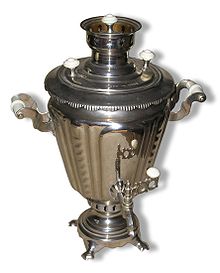samovar
English
[edit]
Etymology
[edit]From Russian самова́р (samovár, “self-boiler”); from само́ (samó, “self”) + вари́ть (varítʹ, “boil, cook”).
Noun
[edit]samovar (plural samovars)
- A metal urn with a spigot, for boiling water for making tea. Traditionally, the water is heated by hot coals or charcoal in a chimney-like tube which runs through the center of the urn. Today, it is more likely that the water is heated by an electric coil.
- 1919, Ronald Firbank, Valmouth, Duckworth, hardback edition, page 107
- Come on now with the samovar - and make haste sorting the letter-bag.
- 1932, Maurice Baring, chapter 20, in Friday's Business[1]:
- Eurydice pointed to the cupboard, and sat down on the low divan with folded hands, and looked at the floor. […] Elsa made her drink a glass of vodka. Then she fetched the samovar from the kitchen, and made tea.
- 1919, Ronald Firbank, Valmouth, Duckworth, hardback edition, page 107
Translations
[edit]
|
Azerbaijani
[edit]Alternative forms
[edit]Etymology
[edit]Borrowed from Russian самова́р (samovár).
Pronunciation
[edit]Audio: (file) - Hyphenation: sa‧mo‧var
Noun
[edit]samovar (definite accusative samovarı, plural samovarlar)
Declension
[edit]| Declension of samovar | ||||||||
|---|---|---|---|---|---|---|---|---|
| singular | plural | |||||||
| nominative | samovar |
samovarlar | ||||||
| definite accusative | samovarı |
samovarları | ||||||
| dative | samovara |
samovarlara | ||||||
| locative | samovarda |
samovarlarda | ||||||
| ablative | samovardan |
samovarlardan | ||||||
| definite genitive | samovarın |
samovarların | ||||||
Further reading
[edit]- “samovar” in Obastan.com.
Czech
[edit]Etymology
[edit]Borrowed from Russian самова́р (samovár). By surface analysis, samo- (“self-”) + vařit (“to boil”).
Pronunciation
[edit]Noun
[edit]samovar m inan (diminutive samovárek)
Declension
[edit]Further reading
[edit]- “samovar”, in Příruční slovník jazyka českého (in Czech), 1935-1957
- “samovar”, in Slovník spisovného jazyka českého (in Czech), 1960–1971, 1989
- “samovar”, in Internetová jazyková příručka (in Czech)
French
[edit]Etymology
[edit]Borrowed from Russian самова́р (samovár).
Pronunciation
[edit]Noun
[edit]samovar m (plural samovars)
Further reading
[edit]- “samovar”, in Trésor de la langue française informatisé [Digitized Treasury of the French Language], 2012.
Portuguese
[edit]Etymology
[edit]Borrowed from French samovar, from Russian самова́р (samovár).
Pronunciation
[edit]
Noun
[edit]samovar m (plural samovares)
- samovar (metal urn used to make tea)
Romanian
[edit]Etymology
[edit]Borrowed from Russian самовар (samovar); from само́ (samó, “self”) + вари́ть (varítʹ, “boil, cook”).
Noun
[edit]samovar n (plural samovare)
- samovar (metal urn used to make tea)
Declension
[edit]| singular | plural | |||
|---|---|---|---|---|
| indefinite articulation | definite articulation | indefinite articulation | definite articulation | |
| nominative/accusative | (un) samovar | samovarul | (niște) samovare | samovarele |
| genitive/dative | (unui) samovar | samovarului | (unor) samovare | samovarelor |
| vocative | samovarule | samovarelor | ||
Serbo-Croatian
[edit]Etymology
[edit]Borrowed from Russian самова́р (samovár, literally “self-boiler”); from само́ (samó, “self”) + вари́ть (varítʹ, “to boil, cook”).
Pronunciation
[edit]Noun
[edit]sȁmovār m (Cyrillic spelling са̏мова̄р)
Spanish
[edit]Pronunciation
[edit]Noun
[edit]samovar m (plural samovares)
Further reading
[edit]- “samovar”, in Diccionario de la lengua española, Vigésima tercera edición, Real Academia Española, 2014
Uzbek
[edit]Etymology
[edit]Borrowed from Russian самова́р (samovár).
Noun
[edit]samovar (plural samovarlar)
- samovar (metal urn used to make tea)
Declension
[edit]| singular | plural | |
|---|---|---|
| nominative | samovar | samovarlar |
| genitive | samovarning | samovarlarning |
| dative | samovarga | samovarlarga |
| definite accusative | samovarni | samovarlarni |
| locative | samovarda | samovarlarda |
| ablative | samovardan | samovarlardan |
- English terms borrowed from Russian
- English terms derived from Russian
- English lemmas
- English nouns
- English countable nouns
- English terms with quotations
- en:Cookware and bakeware
- en:Russia
- Azerbaijani terms borrowed from Russian
- Azerbaijani terms derived from Russian
- Azerbaijani terms with audio links
- Azerbaijani lemmas
- Azerbaijani nouns
- az:Cookware and bakeware
- Czech terms borrowed from Russian
- Czech terms derived from Russian
- Czech terms prefixed with samo-
- Czech terms with IPA pronunciation
- Rhymes:Czech/ovar
- Rhymes:Czech/ovar/3 syllables
- Czech lemmas
- Czech nouns
- Czech masculine nouns
- Czech inanimate nouns
- Czech masculine inanimate nouns
- Czech hard masculine inanimate nouns
- cs:Cookware and bakeware
- cs:Tea
- French terms borrowed from Russian
- French terms derived from Russian
- French 3-syllable words
- French terms with IPA pronunciation
- French terms with audio links
- French lemmas
- French nouns
- French countable nouns
- French masculine nouns
- fr:Cookware and bakeware
- Portuguese terms borrowed from French
- Portuguese terms derived from French
- Portuguese terms derived from Russian
- Portuguese 3-syllable words
- Portuguese terms with IPA pronunciation
- Portuguese 4-syllable words
- Portuguese lemmas
- Portuguese nouns
- Portuguese countable nouns
- Portuguese masculine nouns
- pt:Cookware and bakeware
- Romanian terms borrowed from Russian
- Romanian terms derived from Russian
- Romanian lemmas
- Romanian nouns
- Romanian countable nouns
- Romanian neuter nouns
- Serbo-Croatian terms borrowed from Russian
- Serbo-Croatian terms derived from Russian
- Serbo-Croatian terms with IPA pronunciation
- Serbo-Croatian lemmas
- Serbo-Croatian nouns
- Serbo-Croatian masculine nouns
- sh:Cookware and bakeware
- Spanish 3-syllable words
- Spanish terms with IPA pronunciation
- Rhymes:Spanish/aɾ
- Rhymes:Spanish/aɾ/3 syllables
- Spanish lemmas
- Spanish nouns
- Spanish countable nouns
- Spanish masculine nouns
- Uzbek terms borrowed from Russian
- Uzbek terms derived from Russian
- Uzbek lemmas
- Uzbek nouns
- uz:Cookware and bakeware
